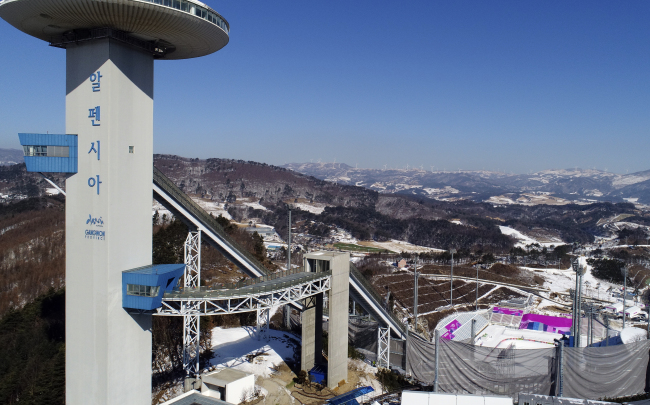The ongoing test events for the upcoming 2018 PyeongChang Winter Olympic Games have been revealing the potential problems of hosting the international event, with organizers working to address them before next year’s games.
From November last year to April, the PyeongChang Organizing Committee for the 2018 Olympic and Paralympic Winter Games is slated to hold 26 international events.
Test events are in full swing this month, with the venues in PyeongChang and the neighboring city of Gangneung having hosted the Cross-country and Nordic combined World Cups and International Skating Union Single Distance Speed Skating Championships.
 |
| Alpensia Ski Jumping Centre in Pyeongchang (Park Hyun-koo/The Korea Herald) |
These events, however, also presented potential challenges for hosting thousands of tourists in a region where the two main host cities, PyeongChang and Gangneung, only have populations of some 44,000 and 217,000, respectively.
Traffic and accommodations are the primary issues.
One of the events to commemorate the upcoming games, the Gyeongpo World Fireworks Festival held in Gangneung last weekend, managed to attract 150,000 visitors. But most of them were jam-packed into narrow roads made even narrower by illegally parked cars.
It was reported that while the main venue on the beach was open to those with tickets, nearly half of the seats were empty.
Other issues raised by local media include the lack of dining options. The eateries near the games venues offer almost exclusively Korean food. As of early February, no Western-style restaurants — or non-Asian restaurants — could be found near the stadiums in PyeongChang.
Although organizers said participants of the recent test event had not complained about this — as food was provided for them at a hotel — they admitted this could be an issue for those who come to watch the games.
“There will be many international tourists, and it is true that the restaurants and accommodations are in short supply. I believe this will be dealt with before the Olympic Games,” said Kim Hee-sun of the POCOG.

Sung Baik-you, the spokesperson of the POCOG, said the new high-speed rail services connecting Seoul and PyeongChang — slated to be operational by the end of the year — will make up for the lack of hotels.
Even if tourists stay in Seoul, the transportation within PyeongChang remains problematic. The four-lane road leading to the venue for the opening and closing ceremonies is one of the wider roads in the county, but it is not able to serve thousands of visitors at once.
Moreover, there is a lack of parking space around the venues.
“Visitors will not be able to park near the arenas. … The area around the venues will be regulated,” said Kim.
This measure is to minimize traffic congestion around the venues, she explained, but this also means visitors will be confined to shuttle buses when travelling to and from arenas.
Another issue was the lack of directions in foreign languages, particularly on parking and ticketing in the arenas.
The organizers said the year leading up to the opening ceremony will allow them to fix whatever shortcomings the test events have shown.
According to Kim, the POCOG plans to address the traffic problem by operating what the organizers call a “transportation hub.” They will create … several large parking areas that will be placed adjacent to the arenas, from where shuttle buses to the venues will operate.
During the World Curling Federation competition, which begins Thursday, the organizers will hold a trial operation of the transportation hub near Gyeongpo lake.
“We admit that there are areas that need work. We will check to find what these are and make sure that the appropriate measures are taken before the Olympic Games,” Kim said.

